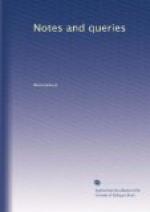“Hofmann, in
Seleucus, says that the area of Seleucus is
called Terik Dhylkarnain,
i.e. Epocha Alexandri Cornigen. Tarik
means probably the date of
an event.”
There can be no doubt that the word in Chaucer is this Arabic word; nor, I think, that Speght’s story is really taught by the Arabs, our teachers in mathematics. Whether the application is from Alexander, (they would know nothing of his date with regard to Pythagoras), or merely from two-horned, is doubtful. The latter might possibly mean the ox.
Mr. Halliwell gives a quotation from Stanyhurst, in which it means “dull persons”—an obvious misuse of it for Englishmen, and which Skene fortifies by an A.-S. derivation, but which is clearly not Cressida’s meaning, or she would have said, “I am Dulcarnon,” not “I am at Dulcarnon;” and so Mrs. Roper.
It may seem difficult what Pandarus can mean:
“Dulcarnon clepid is fleming of
wretches,
It semith hard, for wretchis wol nought
lere
For very slouthe, or othir wilfull tetches,
This said is by them that ben’t
worth two fetches,
But ye ben wise.”
Whether he means that wretches call it fleming or not, his argument is, “You are not a wretch.” Speght’s derivation seems to mean, “Quod stultos vertit.” Fleamas, A.-S. (Lye), is fuga, fugacio, from flean, to flee. Pandarus, I think, does not mean to give the derivation of the word, but its application of fools, a stumbling-block, or puzzle.
C.B.
[Footnote 5: Speght gives
it in English letters, but Selden in
Arabic.]
[Footnote 6: Christman,
Comment. in Alfragan, cap. ii.
Lysimachi Cornuum apud
Cael. Rhodigin. Antiq. lect. 10. cap.
xii., hic genuina interpretatio.]
Dr. Maginn.—The best account of this most talented but unfortunate man, is given in the Dublin University Mag., vol. xxiii. p. 72. A reprint of this article, with such additional particulars of his numerous and dispersed productions as might be supplied, would form a most acceptable volume.
F.R.A.
America known to the Ancients.—To the list of authorities on this subject given in Vol. i., p. 342., I have the pleasure to add Father Laffiteau; Bossu[7], in his Travels through Louisiana; and though last, not least, Acosta, who in his Naturall and Morall Historie of the East and West Indies, translated by E.G. [Grimestone], 1604, 4to., devotes eighty-one pages to a review of the opinions of the ancients on the new world.




